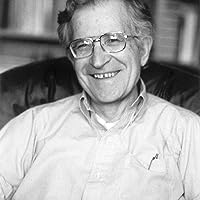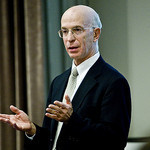Consensus Quotes
Quotes tagged as "consensus"
Showing 1-30 of 81

“I want to pause here and talk about this notion of consensus, and the rise of what has been called consensus science. I regard consensus science as an extremely pernicious development that ought to be stopped cold in its tracks. Historically, the claim of consensus has been the first refuge of scoundrels; it is a way to avoid debate by claiming that the matter is already settled. Whenever you hear the consensus of scientists agrees on something or other, reach for your wallet, because you're being had.
Let's be clear: the work of science has nothing whatever to do with consensus. Consensus is the business of politics. Science, on the contrary, requires only one investigator who happens to be right, which means that he or she has results that are verifiable by reference to the real world. In science consensus is irrelevant. What is relevant is reproducible results. The greatest scientists in history are great precisely because they broke with the consensus.
There is no such thing as consensus science. If it's consensus, it isn't science. If it's science, it isn't consensus. Period.”
―
Let's be clear: the work of science has nothing whatever to do with consensus. Consensus is the business of politics. Science, on the contrary, requires only one investigator who happens to be right, which means that he or she has results that are verifiable by reference to the real world. In science consensus is irrelevant. What is relevant is reproducible results. The greatest scientists in history are great precisely because they broke with the consensus.
There is no such thing as consensus science. If it's consensus, it isn't science. If it's science, it isn't consensus. Period.”
―

“Hamas is regularly described as 'Iranian-backed Hamas, which is dedicated to the destruction of Israel.' One will be hard put to find something like 'democratically elected Hamas, which has long been calling for a two-state settlement in accord with the international consensus'—blocked for over 30 years by the US and Israel. All true, but not a useful contribution to the Party Line, hence dispensable.”
― Gaza in Crisis: Reflections on Israel's War Against the Palestinians
― Gaza in Crisis: Reflections on Israel's War Against the Palestinians

“The basic project of art is always to make the world whole and comprehensible, to restore it to us in all its glory and its occasional nastiness, not through argument but through feeling, and then to close the gap between you and everything that is not you, and in this way pass from feeling to meaning. It's not something that committees can do. It's not a task achieved by groups or by movements. It's done by individuals, each person mediating in some way between a sense of history and an experience of the world.”
― The Shock of the New
― The Shock of the New

“Most people do not really want others to have freedom of speech, they just want others to be given the freedom to say want they want to hear.”
―
―

“I would remind you to notice where the claim of consensus is invoked. Consensus is invoked only in situations where the science is not solid enough. Nobody says the consensus of scientists agrees that E=mc2. Nobody says the consensus is that the sun is 93 million miles away. It would never occur to anyone to speak that way.”
―
―

“The theory of phlogiston was an inversion of the true nature of combustion. Removing phlogiston was in reality adding oxygen, while adding phlogiston was actually removing oxygen. The theory was a total misrepresentation of reality. Phlogiston did not even exist, and yet its existence was firmly believed and the theory adhered to rigidly for nearly one hundred years throughout the eighteenth century. ... As experimentation continued the properties of phlogiston became more bizarre and contradictory. But instead of questioning the existence of this mysterious substance it was made to serve more comprehensive purposes. ... For the skeptic or indeed to anyone prepared to step out of the circle of Darwinian belief, it is not hard to find inversions of common sense in modern evolutionary thought which are strikingly reminiscent of the mental gymnastics of the phlogiston chemists or the medieval astronomers.
To the skeptic, the proposition that the genetic programmes of higher organisms, consisting of something close to a thousand million bits of information, equivalent to the sequence of letters in a small library of one thousand volumes, containing in encoded form countless thousands of intricate algorithms controlling, specifying and ordering the growth and development of billions and billions of cells into the form of a complex organism, were composed by a purely random process is simply an affront to reason. But to the Darwinist the idea is accepted without a ripple of doubt - the paradigm takes precedence!”
― Evolution: A Theory in Crisis
To the skeptic, the proposition that the genetic programmes of higher organisms, consisting of something close to a thousand million bits of information, equivalent to the sequence of letters in a small library of one thousand volumes, containing in encoded form countless thousands of intricate algorithms controlling, specifying and ordering the growth and development of billions and billions of cells into the form of a complex organism, were composed by a purely random process is simply an affront to reason. But to the Darwinist the idea is accepted without a ripple of doubt - the paradigm takes precedence!”
― Evolution: A Theory in Crisis

“Incestuous, homogeneous fiefdoms of self-proclaimed expertise are always rank-closing and mutually self-defending, above all else.”
―
―

“We need an assembly, not for cleverness, but for setting things straight.”
― Lord of the Flies
― Lord of the Flies

“So many of the professional foreign policy establishment, and so many of their hangers-on among the lumpen academics and journalists, had become worried by the frenzy and paranoia of the Nixonian Vietnam policy that consensus itself was threatened. Ordinary intra-mural and extra-mural leaking, to such duly constituted bodies as Congress, was getting out of hand. It was Kissinger who inaugurated the second front or home front of the war; illegally wiretapping the telephones even of his own staff and of his journalistic clientele. (I still love to picture the face of Henry Brandon when he found out what his hero had done to his telephone.) This war against the enemy within was the genesis of Watergate; a nexus of high crime and misdemeanour for which Kissinger himself, as Isaacson wittily points out, largely evaded blame by taking to his ‘shuttle’ and staying airborne. Incredibly, he contrived to argue in public with some success that if it were not for democratic distempers like the impeachment process his own selfless, necessary statesmanship would have been easier to carry out. This is true, but not in the way that he got newspapers like Rees-Mogg’s Times to accept.”
―
―

“This isn't to deny that there were fierce arguments, at the time and ever since, about the causes and goals of both the Civil War and the Second World War. But 1861 and 1941 each created a common national narrative (which happened to be the victors' narrative): both wars were about the country's survival and the expansion of the freedoms on which it was founded. Nothing like this consensus has formed around September 11th.... Indeed, the decade since the attacks has destroyed the very possibility of a common national narrative in this country.”
―
―

“Ultimately a genuine leader is not a searcher for consensus but a molder of consensus.”
― Where Do We Go from Here: Chaos or Community?
― Where Do We Go from Here: Chaos or Community?

“Truth is an ideal we aspire to. Fact is an agreement on the general consensus of what truth is. Honesty is a personal truth shared.”
―
―

“We cannot pander or wait for consensus; the world is too big and complicated and rigged. We are saying the things that people don't like.”
― The Witches Are Coming
― The Witches Are Coming

“The jangling, dissonant sound of modern politics; the anger on cable television and the evening news; the fast pace of social media; the headlines that clash with one another when we scroll through them; the dullness, by contrast, of the bureaucracy and the courts; all of this has unnerved that part of the population that prefers unity and homogeneity. Democracy itself has always been loud and raucous, but when its rules are followed, it eventually creates consensus. The modern debate does not. Instead, it inspires in some people the desire to forcibly silence the rest.”
― Twilight of Democracy: The Seductive Lure of Authoritarianism
― Twilight of Democracy: The Seductive Lure of Authoritarianism

“It is a funny aspect of life, thought Charlie, how a group of grown people can convince themselves to do something that none of them really want to do. They start by talking an idea into existence. Once the idea begins to take shape and dimension, they'll talk away their hesitations, replacing them with all the supposed benefits, one by one. They'll talk away their instincts and their second thoughts and their common sense too, until they are moving in lockstep together toward some shared intention that doesn't appeal to any one of them.”
― Table for Two
― Table for Two

“Had Newton served on more faculty committees at Cambridge, his first law of motion might have read: A decisionmaking body at rest or in motion tends to stay at rest or in motion in the same direction unless acted upon by an outside force.”
― Central Banking in Theory and Practice
― Central Banking in Theory and Practice

“The dual state model is incomplete in yet one more crucial dimension: it leaves out public opinion. It is not enough to study the way a fascist regime exerted its authority from above; one must also explore how it interacted with its public. Did a majority of the population support fascist regimes consensually, even with enthusiasm, or were they bent to submission by force and terror? The terror model has prevailed, partly because it serves as an alibi for the peoples concerned. But recent scholarship has tended to show that terror was selective and that consensus was high in both Nazi Germany and Fascist Italy.
Neither regime was conceivable without terror. Nazi violence was omnipresent and highly visible after 1933. The concentration camps were not hidden, and executions of dissidents were meant to be known. The publicity of Nazi violence does not mean that support for the regime was coerced, however. Since the violence was directed at Jews, Marxists, and “asocial” outsiders (homosexuals, Gypsies, pacifists, the congenitally insane or crippled, and habitual criminals—groups that many Germans were often happy to see the last of ), Germans often felt more gratified than threatened by it. The rest soon learned to keep silent. Only at the end, as the Allies and the Russians closed in, when the authorities attacked anyone accused of giving in, did the Nazi regime turn its violence upon ordinary Germans.”
― The Anatomy of Fascism
Neither regime was conceivable without terror. Nazi violence was omnipresent and highly visible after 1933. The concentration camps were not hidden, and executions of dissidents were meant to be known. The publicity of Nazi violence does not mean that support for the regime was coerced, however. Since the violence was directed at Jews, Marxists, and “asocial” outsiders (homosexuals, Gypsies, pacifists, the congenitally insane or crippled, and habitual criminals—groups that many Germans were often happy to see the last of ), Germans often felt more gratified than threatened by it. The rest soon learned to keep silent. Only at the end, as the Allies and the Russians closed in, when the authorities attacked anyone accused of giving in, did the Nazi regime turn its violence upon ordinary Germans.”
― The Anatomy of Fascism

“The consensus that violates and breaks the rule, law, and principle; accordingly, it neither executes voting nor fairness; however, it only enforces its hegemony, conspiracy, and criminal act.”
―
―

“You’ll mold the minds of men and women to your will, and make any group yield to the dominion of your voice. Even more important, you’ll get them to want to yield, to commit to your plan, and to consider the result a consensus.”
― Thank You for Arguing: What Aristotle, Lincoln, and Homer Simpson Can Teach Us About the Art of Persuasion
― Thank You for Arguing: What Aristotle, Lincoln, and Homer Simpson Can Teach Us About the Art of Persuasion

“In contrast to positional bargaining, the principled negotiation method of focusing on basic interests, mutually satisfying options, and fair standards typically results in a wise agreement. The method permits you to reach a gradual consensus on a joint decision efficiently.”
― Getting to Yes: Negotiating Agreement Without Giving In
― Getting to Yes: Negotiating Agreement Without Giving In

“Seduction is manipulation, manipulation is half of argument, and therefore many of us shy from it. But seduction offers more than just consensual sex. It can bring you consensus. Even Aristotle, that logical old soul, believed in the curative powers of seduction. Logic alone will rarely get people to do anything. They have to desire the act. You may not like seduction’s manipulative aspects; still, it beats fighting, which is what we usually mistake for an argument.”
― Thank You for Arguing: What Aristotle, Lincoln, and Homer Simpson Can Teach Us About the Art of Persuasion
― Thank You for Arguing: What Aristotle, Lincoln, and Homer Simpson Can Teach Us About the Art of Persuasion
“Once people have that sense that their voice is being recognized, they then are more willing to move to consensus. Once people feel that their ideas are respected, I think that you will find a move toward cooperation. People are much more conciliatory once they feel they've been respected. That's the threshold we need to get to: the idea of respecting different viewpoints.
(from the book The NPR Interviews 1995 edited by Robert Siegel)”
―
(from the book The NPR Interviews 1995 edited by Robert Siegel)”
―

“One of the biggest challenges with words in the language we use is the assumption that they should mean the same thing to each one of us, or the more dangerous assumption that we all have reached consensus on what they should mean. And because ruling classes know that every word can be deep and mean many things to each of us, they are sure to hammer words repeatedly against the anvil of our consciousness and imagination, until these words begin to mean what they want them to mean when they fall on people’s ears or encounter their eyes. This is precisely how and why language is extremely slippery and could become a prison or a pair of wings to fly with, depending on how we use and nourish it.”
―
―
“The value of free speech lies not just in the protection of popular opinions but in the shelter it provides for dissenting voices. It is the force that guards against the tyranny of majority thought, ensuring that minority perspectives are not silenced but are given a fair hearing. The true strength of a society is measured by its willingness to embrace discomfort, confront challenging ideas, and forge consensus through open dialogue rather than stifling dissent.”
―
―

“English: "Consensus on non-existence is easier than consensus on the manner of existence."
Česky: „Shoda o neexistenci je snazší než shoda o způsobu existence.”
―
Česky: „Shoda o neexistenci je snazší než shoda o způsobu existence.”
―
“A consensus by itself is meaningless. It was once the consensus that the earth was flat, that the sun orbited the stationary earth, that the Catholic Church was the source of all Truth, that Jesus Christ was God, and that classical physics was almost perfect, bar a fee minor details. All great advances have come about by overturning the consensus. That’s actually the definition of a great advance! To say that no one should be allowed to challenge or doubt the consensus is just about the most serious anti-science statement that anyone can make. That’s turning science into religion, a faith that no one is allowed to question!
It’s a simple fact that no matter what the scientific consensus is – and science has been wrong about countless things in its history, and even defines itself according to the principles that all of its claims must be capable of falsification or verification, hence it always places a doubt over itself – the consensus can be completely misguided and mistaken. The dogmatic assertion that it is wrong to spread “doubt and confusion” after “a scientific consensus had been reached” is simply chilling. This is the quintessence of the paradigmatic, blinkered scientific thinking attacked by Thomas Kuhn.”
― The Sam Harris Delusion
It’s a simple fact that no matter what the scientific consensus is – and science has been wrong about countless things in its history, and even defines itself according to the principles that all of its claims must be capable of falsification or verification, hence it always places a doubt over itself – the consensus can be completely misguided and mistaken. The dogmatic assertion that it is wrong to spread “doubt and confusion” after “a scientific consensus had been reached” is simply chilling. This is the quintessence of the paradigmatic, blinkered scientific thinking attacked by Thomas Kuhn.”
― The Sam Harris Delusion
“Consensus is not compromise. There is almost always some common ground that everyone can agree on that does not compromise the principles of any of the parties involved. Agreeing with a political opponent does not always equal compromise.”
― Dual Citizenship: Living as a Christian in America
― Dual Citizenship: Living as a Christian in America
“Moving a “consensus point” closer to your “optimal point” can only be accomplished by changing the culture of the group seeking consensus. This shift cannot be accomplished politically or by force; it can only happen as each individual moves closer to the same worldview. From the perspective of a Christian, it can only be accomplished as each individual agrees more closely with the will of God.”
― Dual Citizenship: Living as a Christian in America
― Dual Citizenship: Living as a Christian in America
All Quotes
|
My Quotes
|
Add A Quote
Browse By Tag
- Love Quotes 97k
- Life Quotes 75.5k
- Inspirational Quotes 72.5k
- Humor Quotes 43.5k
- Philosophy Quotes 29.5k
- Inspirational Quotes Quotes 27k
- God Quotes 26k
- Truth Quotes 23.5k
- Wisdom Quotes 23.5k
- Romance Quotes 23k
- Poetry Quotes 22k
- Death Quotes 20k
- Happiness Quotes 18.5k
- Life Lessons Quotes 18.5k
- Hope Quotes 18k
- Faith Quotes 18k
- Quotes Quotes 16.5k
- Inspiration Quotes 16.5k
- Spirituality Quotes 15k
- Religion Quotes 15k
- Motivational Quotes 15k
- Writing Quotes 14.5k
- Relationships Quotes 14.5k
- Life Quotes Quotes 14k
- Love Quotes Quotes 13.5k
- Success Quotes 13.5k
- Time Quotes 12.5k
- Motivation Quotes 12k
- Science Quotes 11.5k
- Knowledge Quotes 11k

